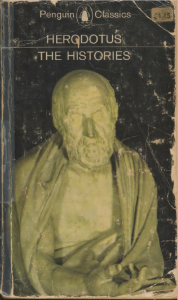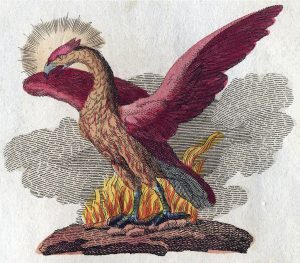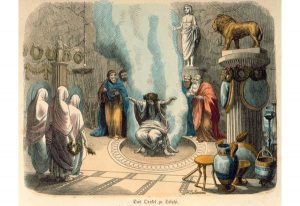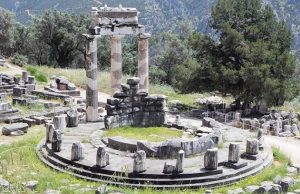
There are two types of miraculous tales in Herodotus’ Histories and Herodotus handled them differently. It is worth having a closer look at how he framed each type.
Gods, Miracles and Wonders
Gods appearing on earth
The Greeks have never been simpletons; for centuries past they have been distinguished from other nations by superior wits; and of all Greeks the Athenians are allowed to be the most intelligent: yet it was at the Athenians’ expense that this ridiculous trick was played. In the village of Paeania there was a handsome woman called Phye, nearly six feet tall, whom they fitted out in a suit of armour and mounted in a chariot; then, after getting her to pose in the most striking attitude, they drove into Athens, where messengers who had preceded them were already, according to their instructions, talking to the people and urging them to welcome Pisistratus back, because the goddess Athene herself had shown him extraordinary honour and was bringing him home to her own Acropolis. They spread this nonsense all over the town, and it was not long before rumour reached the outlying villages that Athene was bringing Pisistratus back, and both villagers and townsfolk, convinced that the woman Phye was indeed the goddess, offered her their prayers and received Pisistratus with open arms. (Book 1.60)
and
The shrine contains no image and no one spends the night there except (if we may believe the Chaldeans who are the priests of Bel) one Assyrian woman, all alone, whoever it may be that the god has chosen. The Chaldaeans also say – though I do not believe them- that the god enters the temple in person and takes his rest upon the bed. (Book 1.182)
To Hades and back
Another story I heard about Rhampsinitus was, that at a later period he descended alive into what the Greeks call Hades, and there played dice with Demeter, sometimes winning and sometimes losing, and returned to earth with a golden napkin which she had given him as a present. . . . Anyone may believe these Egyptian tales, if he is sufficiently credulous; as for myself, I keep to the general plan of this book, which is to record the traditions of the various nations just as I heard them related to me. (Book 2.122)
Immortals
I myself have heard a very different account of Salmoxis from the Greeks who live on the Hellespont and the Black Sea. According to this, he was a man like anyone else, . . . . he used to entertain the leading men of the country with much liberality, and endeavour to teach them that neither he nor they, who were his guests, nor any of their descendants, would ever die, but would go to a place where they would live in perpetual enjoyment of every blessing. All the time that he was trying to promulgate this new doctrine, he was occupied in the construction of an underground chamber, and when it was ready he entered it and disappeared from sight. For three years he lived in this room underground, and his fellow countrymen missed him sadly, and mourned for him as if he were dead; then in the fourth year he reappeared, and in this way persuaded the Thracians that the doctrine he had taught was true. For my part I neither put entire faith in this story of Salmoxis and his underground chamber, nor wholly disbelieve it . . . . (Book 4.95-96)

That famous phoenix
Another sacred bird is the phoenix; I have not seen a phoenix myself, except in paintings, for it is very rare and visits the country (so at least they say at Heliopolis) only at intervals of 500 years, on the occasion of the death of the parent-bird. To judge by the paintings, its plumage is partly golden, partly red, and in shape and size it is exactly like an eagle. There is a story about the phoenix: it brings its parent in a lump of myrrh all the way from Arabia and buries the body in the temple of the Sun. To perform this feat, the bird first shapes some myrrh into a sort of egg as big as it finds, by testing, that it can carry; then it hollows the lump out, puts its father inside and smears some more myrrh over the hole. The egg-shaped lump is then just of the same weight as it was originally. Finally it is carried by the bird to the temple of the Sun in Egypt. I give the story as it was told me – but I don’t believe it. (Book 2.73)
Magic power and werewolves
It is not impossible that these people practise magic; for there is a story current amongst the Scythians and the Greeks in Scythia that once a year every Neurian turns into a wolf for a day or two, and then turns back into a man again. Of course, I do not believe this tale; all the same, they tell it, and even swear to the truth of it. (Book 4.105)
Kneeling statues
. . . until an extraordinary thing happened. Personally I do not believe it, though perhaps somebody may – but the story is that each statue fell upon its knees, and in that attitude both have remained ever since. (Book 5.86)
Miracles authenticate the young and new
The Scythians say that they are the youngest of all nations, and the following is the account they give of their origin. The first man to live in their country, which before his birth was uninhabited, was a certain Targitaus, the son of Zeus and of a daughter of the river Borysthenes – I merely repeat the tradition, and do not myself believe it. Targitaus had three sons, Lipoxais, Arpoxais, and Colaxais, the youngest; and during their reign in Scythia there fell from the sky a golden plough, a golden yoke, a golden battle-axe, and a golden cup. The eldest of the three was the first to see these treasures, and as he went to pick them up the gold caught fire. At this he retired, and the second of the brothers approached; but the gold caught fire and blazed, just as before. Lastly, when the two elder brothers had been kept off by the flames, the youngest came along, and this time the fire went out, so that he was able to pick up the golden implements and carry them home. The elder brothers accepted this as a sign from heaven and made over the whole kingdom to Colaxais. (Book 4.5)
and so forth and so on.
Omens, Signs from God – Apollo of Delphi
The Gospels are prophecy driven narratives. They open with prophecies that Jesus is to come and perform God’s will. Prophecies declare a change in direction when the time comes for him to be crucified and then rise again.

The “Primary History” of Israel (Genesis to 2 Kings) is likewise a prophecy driven history. The plan of history is foretold to Abraham, then to the twelve patriarchs, with subsequent details being foretold other prophets as the narrative moves along.
Mandell and Freedman identify the same motif in Herodotus’ Histories:
The real author’s treatment of the narrative in which the implied narrator reports history could have been either an affectation or a jest of some sort. But it may have been theological grounded in such a way that the god at Delphi, in particular, became the arbiter or at least the regulator of events. In fact, the History can be considered a narrative of the mighty acts of the divinity at Delphi as depicted in “relief” by mankind’s effecting of the god’s design. Today, as in antiquity, not everyone understands that this is the most important motif of the work; and as we have seen, even Aristotle was fooled. This suggests that the implied and perhaps the real author’s religious assumptions were then and are not yet now fully perceived. It also demonstrates, we must iterate, that the real author’s artistic pretexts were eminently successful.
(Mandell and Freedman, 76-77. My bolded highlighting in all quotations)
and
The Herodotean implied narrator holds to the confessional perspective of the worshipper of the god at Delphi, but we do not know whether the real author shared that viewpoint. In any case, the narrative is presented from the implied narrator’s position in which gods, most notably the divinity at Delphi, act in and, hence, influence history (pace, von Rad). So we realized that from the confessional stance of the implied narrator, the work is historical despite its basic theological premises: but from the real reader’s presumably nonconfessional perspective, it is not. . . .
. . . . neither Herodotus’ History nor Primary History should properly be classified as histories save under a confessional rubric . . . .
(Mandell and Freedman, xii-xiii)
Hence prophecies (which is what omens are) and signs from God are plot devices that shape and drive the narrative, in Herodotus’ Histories, Primary History and in the Gospels. Compare Prophecy Driven Narratives in Ancient Fiction.
So Herodotus writes, in Book 5,
Omens come true . . . [Or, The prophetic voice that Cleomenes heard accordingly had its fulfillment. — A.D. Godley‘s translation] (Book 5.72)
Omens sent to kings to warn of consequences of their actions
While he was thinking these arrangements over, he was surprised by an unusual occurrence: snakes swarmed into the suburbs of the town, and on their appearance the horses in the meadows stopped grazing and came and ate them. Croesus, quite rightly, took this extraordinary sight as an omen, and at once sent to Telmessus where there were men who interpreted such things. (Book 1.78)
—
The argument was growing hot, when they suddenly saw seven pairs of hawks chasing two pair of vultures, which they tore at, as they flew, with both beak and claw. It was an omen: forthwith the plan of Darius was unanimously accepted, and with renewed confidence the seven men hurried on towards the palace. (Book 3.76)
—
After the whole army had reached the European shore and the forward march had begun, an extraordinary thing occurred – a mare gave birth to a hare. Xerxes paid no attention to this omen, though the significance of it was easy enough to understand. Clearly it meant that he was to lead an army against Greece with the greatest pomp and circumstance, and then to come running for his life back to the place he started from. There had previously been another strange and ominous occurrence in Sardis, when a mule dropped a foal with a double set of sexual organs, male and female – the former uppermost. Xerxes, however, ignored both omens and continued his march at the head of the army. (Book 7.57)
—
The Persians were now close at hand and within sight of the temple, when suddenly the Priest, whose name was Aceratus, saw weapons lying on the ground in front of the shrine – they were the sacred weapons which no human hand may touch, and they had been brought mysteriously out from their place within. He hastened to report this marvellous thing to the other Delphians who were still in the town. Meanwhile the enemy were drawing quickly nearer, and when they reached the temple of Athene Pronaea even stranger things happened to them than what I have just recorded.
It is surprising enough that weapons of war should move of their own accord and appear upon the ground outside the shrine; but what occurred next is surely one of the most extraordinary things ever known – for just as the Persians came to the shrine of Athene e prophetic voice that Cleomenes heard accordingly had its fulfillment, thunderbolts fell on them from the sky, and two pinnacles of rock, torn from Parnassus, came crashing and rumbling down amongst them, killing a large number, while at the same time there was a great cry from inside the shrine. All these things happening together caused a panic amongst the Persian troops. They fled. . . . (Book 8.37)
—
But when the Delphic omens had served their purpose further elaboration, other omens were mere dressing, entertainment, “what they say though you may not believe it” type stories:
There is a story, I am told, amongst those who got away, that there was yet another miraculous occurrence: they saw, so they said, two gigantic soldiers – taller than ever a man was – pursuing them and cutting them down. According to the Delphians, the mysterious warriors were Phylacus and Autonous, heroes of old whose spirits protected their country. Both have enclosed plots of ground near the temple, which are held sacred to them – that of Phylacus lies along die road above the temple of Pronaea, and that of Autonous is near the spring of Castalia under the peak called Hyampia.
The rocks which fell from Parnassus were preserved until quite recently; they lay in the enclosure round the shrine of Pronaea, where they embedded themselves after crashing through the Persian troops. So now you know how it was that these people took their departure from the Holy Place at Delphi. (Book 8.39)
—
There is a story which used to be told by Dicaeus, the son of Theocydes, an Athenian exile who had made a name for himself in Persia. After the evacuation of Attica, when the Persian troops were devastating the countryside, this person happened to be in the plain of Thria with Demaratus the Spartan. Noticing a cloud of dust, such as might have been raised by an army of thirty thousand men on the march, coming from the direction of Eleusis, they were wondering what troops they could be, when they suddenly heard the sound of voices. Dicaeus thought he recognized the Iacchus song, which is sung at the Dionysiac mysteries, but Demaratus, who was unfamiliar with the religious ceremonial of Eleusis, asked his companion whose voices they were. ‘Sir,’ Dicaeus answered, ‘without any doubt some dreadful disaster is about to happen to the king’s army. There is not a man left in Attica; so the voice we heard must clearly be not of this world – it is a divine voice, coming from Eleusis to bring help to the Athenians and their friends. If it descends upon the Peloponnese, there will be danger for the king and for his army; if it moves towards the ships at Salamis, Xerxes may well lose his fleet. Every year die Athenians celebrate a festival in honour of the Mother and the Maid, and anyone who wishes, from Athens or elsewhere, may be initiated in the mysteries; the sound you heard was the Iacchus song which is always sung at that festival.’
‘Do not breathe a word of this to anybody,’ said Demaratus. ‘If it should reach the ears of the king, you would lose your head, and neither I nor anyone else in the world could save you. So hold your tongue – the gods will see to the king’s army.’
While Demaratus was speaking, the cloud of dust, from which, the tnysterious voice had issued, rose high into the air and drifted away towards Salamis, where the Greek fleet was stationed. By this the two men knew that the naval power of Xerxes was destined to be destroyed. Such was Dicaeus’ story, and he used to appeal to Demaratus and others to witness the truth of it. (Book 8.65)
Herodotus. 1965. Herodotus: The Histories: Newly Translated and with an Introd. by Aubrey de Selincourt. Translated by Aubrey De Sélincourt. Harmondsworth, Middlesex: Penguin Books.
Mandell, Sara, and David Noel Freedman. 1993. The Relationship Between Herodotus’ History and Primary History. Atlanta, Ga: University of South Florida.
If you enjoyed this post, please consider donating to Vridar. Thanks!


This is another example of how predominantly literary issues affect the perception of history. As indicated in a previous post, the scholars who like to point out that all ancient history (or even all history, period) contains “stretchers,” and therefore stretchers are no indication of a lack of reliable history contained in a gospel, fail to take into account the framing of a tale being told; of what is called here the “implied narrator.” Narratology is common in literary studies. Those of us in (or who have been in) that field are aware of different levels of distance between author/narrator/story. The ancient historian is a raconteur, and Herodotus is the quintessential example. But his language demonstrates again and again (as in the examples above) that he is aware of that status, aware of the skepticism that may or will be brought to bear on any tale that he recounts (re-counts; he is usually repeating what he’s heard from another source). This is not at all similar to the gospel narrators. I see in some of the other comments that R.G. Price makes a distinction between the canonical gospel narrators, Mark is unlike Matthew, etc. I think neither, though, is like Herodotus.
I agree that neither is like Herodotus. I don’t think Mark was written in any way to be a historical type account of anything. I’m not sure we can really say with certainty what Mark’s intention was. To me Mark is either a fiction intended as allegory or it is possible that it was written in the theme of some of the narrative midrash that we find at Qumran. Certainly at Qumran they were producing revised and new narratives about various figures like Moses, etc. So one thought is that Mark is such a narrative recasting of Joshua in a present context, after all we have to acknowledge that “Jesus” is Joshua. If we take the view that the “Jesus” cult was a millinarian cult that was re-imagining Joshua as an eternal heavenly high priest, like Melchizedek, who was going to come at the end of the age to institute the Kingdom of God and pass judgement on the world, as many at Qumran imagined, then the cult of which Paul was a part of a cult that was worshiping this Joshua.
Mark would either be an allegory intended to be understood as allegory or its possible it was intended to be taken at a true account derived from scripture in the way that other similar writings at Qumran were likely intended.
But whatever the intent of Mark, I think that Matthew and John took the Markan base and then tried to present it as a literally true narrative. They didn’t do this by using the approach of historians, though, rather they used the approach of chresmologi. For accounts similar to what were being produced by Matthew and John we have to look at prophetic literature. The closest story to the Gospels IMO is the account of Publius from the Book of Wonders. None of the stories in the Book of Wonders read like histories, but they were all intended to be taken as literally true.
I think its clear all of the Gospel writers were following the model of Jewish story telling far more than historians. The Gospels are far more similar to the accounts of Kings and the intro of Daniel. In fact if you read the intro of Daniel its a lot like the Gospels and there are scholars who make a case that Daniel was written written at Qumran. Certainly Daniel was written in the 2nd century. Mark is far more like the first book of Enoch than any kind of historical account.
Personally I class Mark as an apocalyptic work, along with Daniel, Enoch, Ascension of Isaiah, etc. I view Matthew, Luke and John as works that attempted to re-frame this apocalyptic work as “real history”, but the people doing this weren’t historians, they were purveyors of Greek and Roman prophetic literature.
At this that’s how I see it.
Oh, and to add. The question really is, how were the apocalypses intended to be taken? I honestly don’t know. To me knowing Mark’s intent requires knowing the intent of the witter of Enoch and Ascension, etc. I think these stories were intended to be believed as true.
Of course there is also the other issue, which is that such stories were intended to be understood on multiple levels both as literal truth and as allegory. Such the case with Orphic writings. The Derveni Papyrus describes how Orphic poems were written to be taken literally by the uninitiated who hadn’t had their eyes opened, but were to be understood as allegories by the initiated. It’s possible Mark was intended in this way.
I discuss apocalypticism and Daniel in my book, “Son of Yahweh.” My perspective is more limited than what we usually encounter on Vridar, because my interest & background is more purely literary. But the literary does not exclude the historical.
Vridar posts on Clarke’s book and links to it are listed at https://vridar.org/tag/owens-son-of-yahweh/
Looks very interesting, I’ll have to check it out.
BTW, the account of the phoenix is interesting, because 1 Clement talks about this and uses it as proof of the resurrection of Christ. I plan to use this comparison between Herodotus and 1 Clement in my book when I talk about the credulity of early Christians.